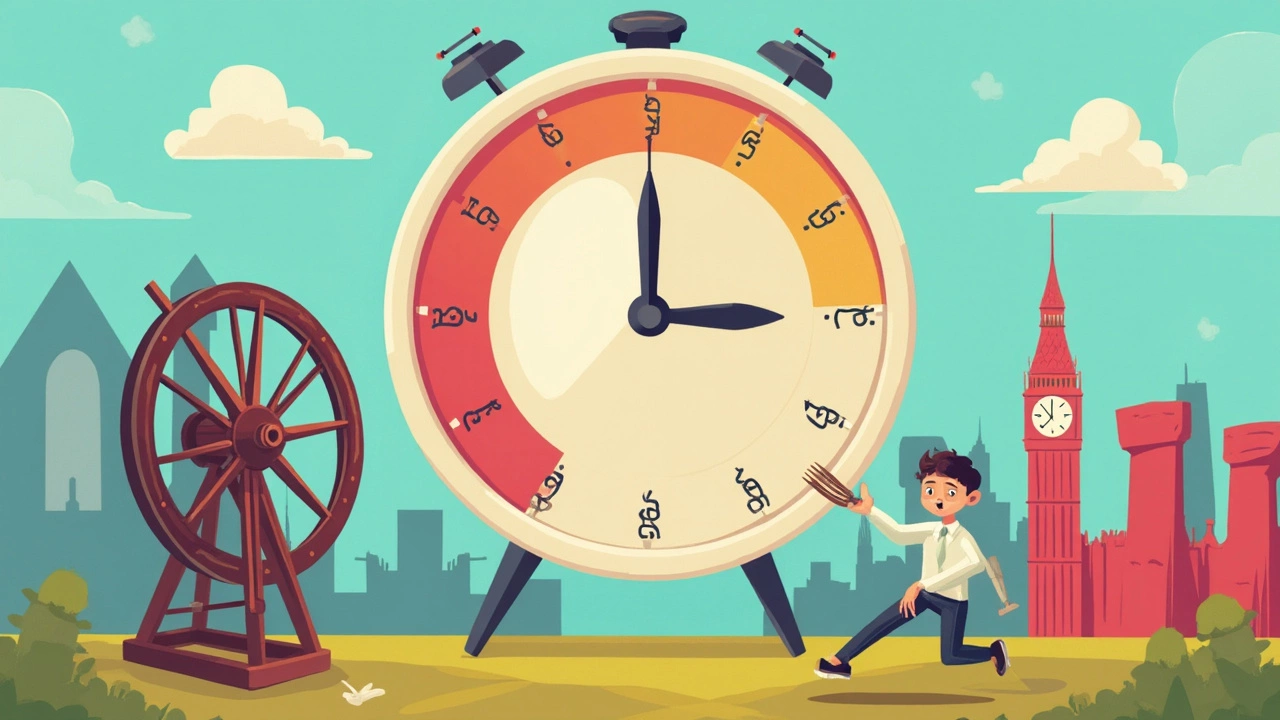So, you've been thinking about eating just once a day to lose weight, right? It's an intriguing idea, and not without its buzz. The thought of skipping meals to see the numbers drop on the scale can feel quite appealing. But before you dive in, let's break down what this really means for your body.
First off, eating once a day essentially means embracing a form of intermittent fasting. It's not entirely new; people have been practicing various fasting methods for ages. The idea is straightforward: you consume all your daily calories in one go and fast for the remaining 23 hours. While it can lead to a calorie deficit, which in theory can help with weight loss, it's not a one-size-fits-all solution.
Now, let's talk about your metabolism. When you eat less often, your metabolism might slow down. The body's smart—it adjusts to preserve energy during long gaps without food. For some, this could mean feeling sluggish or having less energy for daily activities. But hey, if you plan your meals thoughtfully, packing them with nutrients, you'll be in a better spot to keep that engine running smoothly.
- The Science of Eating Once a Day
- Effects on Metabolism and Energy Levels
- Pros and Cons of a One-Meal-A-Day Plan
- Sustainable Eating and Healthy Recipes
- Expert Opinions and Personal Experiences
The Science of Eating Once a Day
Eating once a day, often referred to as OMAD (One Meal A Day), has caught the attention of those eager to explore weight loss and improved health. At the core of OMAD is intermittent fasting, where eating windows are significantly reduced. This eating pattern capitalizes on the fasting period to help with calorie reduction, but there's more to it than just counting calories.
When you limit food intake to a single meal, you're essentially forcing your body to tap into its fat reserves for energy. In theory, this can promote weight loss. However, it's not just about when you eat, but also what you eat. Packing nutrition-dense foods into that one meal is crucial to ensure you get enough vitamins and minerals to support overall health.
Metabolic Changes
The science behind metabolism is complex. When you eat less frequently, your metabolism can adjust and potentially slow down. This is your body's way of preserving energy. But it doesn't mean you're stuck feeling sluggish forever. With the right amount of nutrients, you can maintain your energy levels even on a restricted diet.
There's an interesting aspect of intermittent fasting related to insulin sensitivity. Some studies suggest that fasting can improve how your body handles insulin, which could be beneficial for controlling blood sugar levels. However, it's worth noting that long-term studies and solid evidence are still catching up with the hype.
Considerations for Energy Levels
Skipping meals might sound easy until you hit that midday hunger slump. Your energy levels might drop if your body isn't getting the regular fuel it’s used to. But some OMAD enthusiasts feel that once the body adapts, sustained energy isn't far off. Keep an eye on your energy, and make sure your one meal is doing its job in keeping you fed and fueled.
Before making any drastic changes to your eating habits, it's always a wise idea to consult with a healthcare professional. Everyone's body reacts differently, and what works for one person might not be the best approach for another.
| Aspect | OMAD Impact |
|---|---|
| Weight Loss | Potential calorie deficit |
| Insulin Sensitivity | Possible improvement |
| Energy Levels | May fluctuate |
Effects on Metabolism and Energy Levels
When it comes to weight loss and eating habits, metabolism is often a hot topic. So, what's the deal when you're eating just once a day? Does it rev up that calorie-burning engine or slow it down to a crawl?
Your metabolism is essentially how your body turns what you eat into energy. When you limit your meals, your metabolism might initially slow down. Why? It's the body's natural way of conserving energy when it senses fewer calories coming in. This can be a bit of a bummer if you're hoping for sweet, instant results.
But don't write it off just yet! Some folks thrive on this method. By having one solid, balanced meal packed with nutrients, vitamins, and maybe even a hint of your favorite treat, you might sustain your energy levels smartly. And hey, if you're dosing your water intake properly, you could keep sluggishness at bay.
Keeping Energy Levels Up
Here's the trick—for your one-a-day meal, focus on foods that fuel you up. Think lean proteins and a healthy mix of carbs. You want stuff like chicken, quinoa, and lots of greens. Moving through the day with stable energy means your productivity stays up, and believe it or not, your mood too!
- Choose complex carbs like whole grains—they take longer for your body to break down, which helps you feel full longer.
- Don't skimp on fats. Healthy ones, like avocados and olive oil, are great for keeping energy levels steady.
- Stay hydrated. Seriously, water is the unsung hero of metabolism and energy.
We can't skip the fact that everyone's different. Some may feel on top of the world with this routine, while others might feel their energy dip. Keep an ear out for your body; it usually cues you if things need tweaking.

Pros and Cons of a One-Meal-A-Day Plan
Thinking of trying the one-meal-a-day plan? It's got its perks and pitfalls. So, let's work through them to help you decide if it's the right path for your weight loss journey.
Pros
One of the main attractions of eating once a day is simplicity. No more multiple meals means less planning and less time spent in the kitchen. For busy folks, this can be a big plus.
- Weight Loss: By consuming fewer calories, many experience a decrease in overall body weight. This could be a game changer if you've struggled with traditional diets.
- Improved Focus: Some individuals report better concentration and mental clarity, possibly due to stabilized blood sugar levels after adjusting to the fasting period.
- Stomach Rest: Giving your digestive system a break might help some people with issues like bloating or indigestion.
Cons
However, this approach is not without its downsides. It's crucial to be mindful of these before making a commitment.
- Hunger and Cravings: Eating just once can be tough. The hunger pangs might make sticking to this plan challenging, especially during the initial weeks.
- Nutrient Deficiency: There's a risk of missing out on essential nutrients if the single meal isn't well balanced. It's vital to pack your meal with a variety of foods to cover all bases.
- Social Impact: Social gatherings often revolve around food, and skipping meals can make social situations awkward or unenjoyable.
Overall, there's no denying that the intermittent fasting style of eating once a day appeals to many, especially those who find traditional dieting cumbersome. But it's essential to consider both sides of the coin. Listen to your body and maybe even chat with a healthcare provider to ensure you're making a choice that aligns with your health and lifestyle goals.
Sustainable Eating and Healthy Recipes
Thinking about sticking to eating once a day while keeping it healthy? It’s doable with some planning. The key is making sure that the one meal you do have is packed with nutrients. Eating sustainably isn't just about weight loss, it's about giving your body what it needs to function well.
Balancing the Plate
When you’re on a one-meal-a-day plan, every bite counts. High-quality proteins, healthy fats, and a variety of carbs should make it onto your plate. Think lean meats like chicken or fish, plant-based proteins like beans or tofu, whole grains, and a rainbow of veggies. Don't shy away from adding nuts, seeds, and a good drizzle of olive oil for those omega-3s your body loves.
Portion Control
It might be tempting to load your plate sky-high after fasting all day, but proper portions are crucial. Try filling half your plate with vegetables, a quarter with protein, and the last quarter with whole grains. This visual cue helps manage your intake without needing to count calories religiously.
Recipe Inspiration
Stuck for ideas? Here's a simple recipe to get you started:
- Grilled Chicken and Quinoa Salad: Start with a base of cooked quinoa. Add grilled chicken, a handful of spinach, cherry tomatoes, sliced cucumber, and avocado. Top with pumpkin seeds and dress with a lemon vinaigrette.
- Vegetable Stir-Fry: Sauté broccoli, bell peppers, and carrots in olive oil. Add tofu or shrimp for protein, and season with soy sauce and garlic. Serve over brown rice or noodles.
- Hearty Lentil Stew: Combine lentils, diced tomatoes, carrots, and spinach with vegetable broth. Season with cumin and coriander. Simmer until thick and hearty – perfect for a satisfying meal.
Meal Planning and Prep
Prepping your meals in advance can be a game changer, especially when you're eating just once. Keep ingredients ready in the fridge so you’re never caught off-guard when it's dinner time.
Staying Hydrated
Don't forget to drink water throughout the day. Sometimes what you think is hunger is actually thirst. Staying hydrated helps keep everything in balance, and trust me, your energy levels will thank you.
This way, you can maintain a healthy lifestyle, not just a trend-driven diet. After all, knowing how to eat sustainably is far more valuable than any quick fix could ever be.

Expert Opinions and Personal Experiences
When it comes to eating just once a day, experts have varied thoughts. Many nutritionists agree that while it might lead to short-term weight loss, it's crucial to consider the impact on overall health and long-term sustainability.
Nutritionists Weigh In
Nutritionist Jane Miller points out that eating a single meal can mean not getting all the essential nutrients our bodies need daily. She emphasizes balancing the meal with proteins, healthy fats, and carbs to avoid nutrient deficiencies. According to her, "Our bodies thrive on consistency. Extreme changes in eating habits can throw our systems off balance."
Dr. Robert Lang, a metabolic researcher, highlights that everyone's body reacts differently to fasting routines. While some may experience increased focus and energy, others might feel tired or dizzy due to low blood sugar levels. Lang suggests staying in tune with your body and adjusting the plan as needed.
Personal Stories
Tina, a fitness enthusiast, shared her journey of shifting to one meal a day. "At first, I noticed a drop in weight, and it felt great," she recollects. "But over time, I felt hungry and irritable throughout the day." She adjusted her routine to occasional fasting combined with multiple small meals, promoting both physical and mental well-being.
Real-World Data
To put it in perspective, a study surveyed 100 intermittent fasters, noting their experiences. The table below shows the percentage of individuals who continued with the one-meal-a-day approach for more than six months:
| Duration | Percentage |
|---|---|
| Less than 3 months | 60% |
| 3-6 months | 25% |
| More than 6 months | 15% |
Ultimately, hearing from those who've tried it and tested experts' views gives us valuable insights. If you're considering going down this path, leverage both evidence and anecdotal experiences to make an informed decision.

